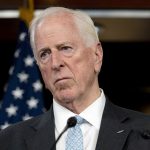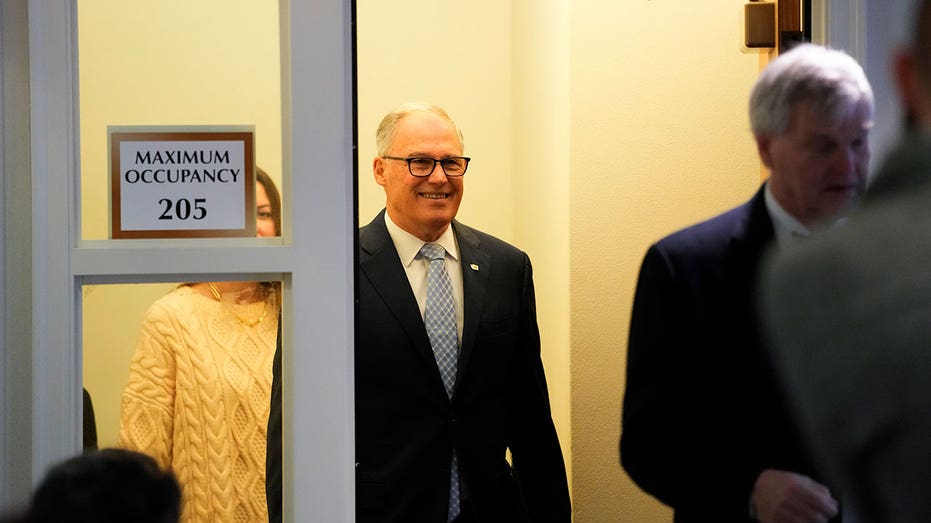Lawmakers in Washington state will return to Olympia on Monday to address housing, climate change and the fentanyl crisis in an abbreviated legislative session that marks Jay Inslee’s final one as governor.
During a session preview this week, the Democratic governor described climate as the biggest long-term issue he wants to address this session. He referenced his six grandchildren and his fear about what the environment will look like when they’re his age.
“I am going to do everything I can in the next 60 days to make sure we have a brighter vision for everybody’s grandkids,” he said.
GOV. JAY INSLEE WON’T SEEK RE-ELECTION, ENDING SPECULATION OVER UNPRECEDENTED 4TH TERM
Majority Democrats will also be playing defense. A conservative group has submitted hundreds of thousands of signatures in support of initiatives that threaten some of their biggest recent wins, including the 1-year-old Climate Commitment Act, a landmark policy that created a “cap and invest” system for carbon emissions. The initiatives have been provisionally certified and will end up on the November ballot, Democratic House Speaker Laurie Jinkins said.
“I do look forward to the conversation with Washington voters … I don’t think the voters in this state particularly want to turn our backs on climate change,” she said.
The 60-day election-year session will feature hundreds of bills and see lawmakers approve a supplemental budget based on a proposal by Inslee. Democrats control the House by a margin of 58-40 and the Senate by 29-20.
Here are some key proposals that will be considered:
HOUSING
After a 2023 legislative session filled with proposals to address the housing crisis, lawmakers are once more facing off against staggeringly high home and rental prices.
One bill would require that 10% of the units in new housing around transit hubs, including bus rapid transit and light rail, be affordable for lower income residents. Another would focus on rent stabilization, barring landlords from increasing rent by more than 5% annually during a rental agreement term.
Democratic Sen. Yasmin Trudeau, who is sponsoring both proposals, called the rental market “untenable.”
“People are having to make decisions about whether they buy food or whether they pay rent,” she said. “And that’s not a society I think any of us want to live in.”
House Minority Leader Drew Stokesbary, a Republican, said the focus should be on increasing the supply of housing, referencing a proposal that would provide additional property tax credits for builders to add affordable multi-family housing.
“The biggest and maybe the only thing we can really meaningfully do is grow the supply of housing stock,” he said. “We need more housing, period. Housing of all types.”
CLIMATE CHANGE
Lawmakers on both sides are proposing legislation related to the Climate Commitment Act, which works to cap and reduce climate pollution while creating revenue for climate investments. It includes quarterly auctions in which emission allowances are sold to businesses covered under the act, and they raised $1.8 billion dollars in 2023, according to the Department of Ecology.
Some Democratic lawmakers are pushing to increase transparency surrounding oil prices in the face of high gas prices and complaints that the climate act is to blame.
Others want to link the carbon market with California and Quebec — which also have emission allowance auctions — so the auctions of emission allowances would include all three jurisdictions.
At the same time, Republican lawmakers have proposed requiring that utility companies list on bills charges resulting from the climate act.
Outside of the climate act, there will be efforts to electrify school buses statewide and a push to make tires more efficient so vehicles get better mileage.
“It makes the program more durable and stable, and provides more opportunities for the market to do what it’s supposed to do, which is to provide investments for us to invest in non-fossil economies,” said state Rep. Beth Doglio, chair of the House Environment & Energy Committee.
DRUGS
As overdose deaths rise in Washington, some lawmakers are doubling down on the fight against fentanyl by proposing legislation that would increase access to opioid overdose reversal medications and education.
BLUE STATE’S $143 MILLION HOMELESS PROGRAM GOT LESS THAN A THOUSAND PEOPLE HOUSED
One bill would require all school districts make naloxone available in high schools, instead of only districts with at least 2,000 students. Another proposal would help bring information about fentanyl into K-12 public schools.
“It has become a significant problem in our society. It’s incredibly powerful and it’s being mixed with everything and it’s very available,” said Democratic Sen. Lisa Wellman, of Mercer Island, who sponsored the bill.
Last year, there were more than 1,000 fentanyl overdose deaths in King County, which includes Seattle, according to the King County Medical Examiner’s Office.
The work comes less than eight months after the state approved a major new drug policy that keeps controlled substances illegal while boosting resources to help those struggling with addiction.
























